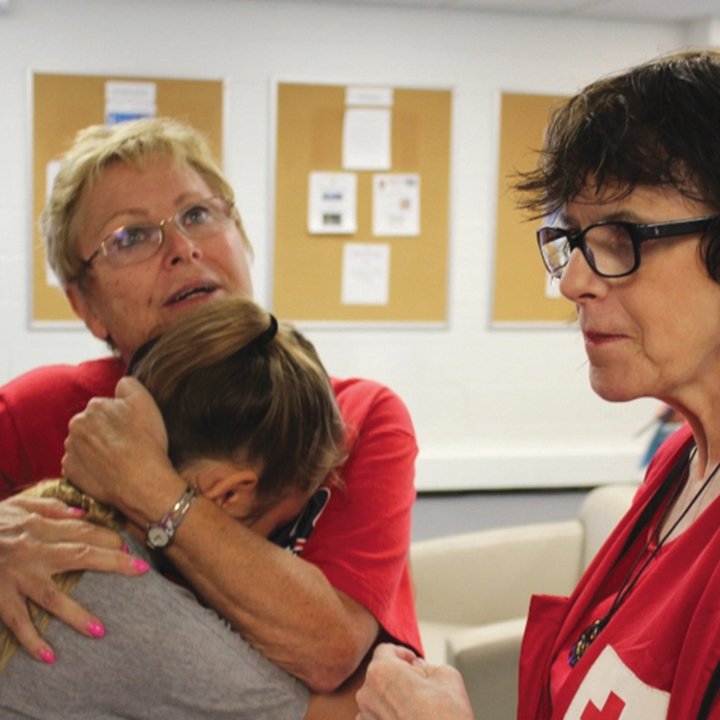Mass Violence Tip Sheets | Health Care Practitioners

Voices Center for Resilience Mass Violence Tip Sheets
Tips for Health Care Practitioners
Providing Care to Those Affected by Mass Violence
Practitioners can greatly reduce survivors’ fear and anxiety through compassionate communication and empathy. Understand that this is stressful work even for the well-trained. You may be exposed to scenes of human remains and suffering, massive destruction, and life-and-death decision making, all while you yourself are in harm’s way. You may endure intense workloads and long hours with limited resources, often while being separated from your own family and support network.
Tips for Interacting with Survivors and Victims’ Family Members
- Make sure you have clear identification and explain your role.
- Give them a way to reach you so they feel connected to help.
- Speak clearly and offer to write things down on their behalf.
- Remember that no matter how global the event seems, it will be local and immediate to the one being impacted.
- Assess those impacted for immediate needs, and establish a sense of safety for the survivor.
- Act as a liaison or buffer between a survivor and the media if needed.
- Be sensitive to cultural norms and differences, including dietary needs.
- Understand that diverse geographic locations and multiple languages can present challenges.
- Be aware of the impact that the loss of colleagues can have on survivors.
- Don’t ignore extended family relationships such as grandparents, adult siblings, cousins, and friends of the family.
- ALWAYS be truthful. If you don’t know an answer, say so, and try to get information if it is possible.

Voices Center for Resilience Mass Violence Tip Sheets
Assessing Immediate Needs
- Check for bodily harm and other medical needs.
- Ensure access to clean water and clean air.
- Determine whether the person has safe housing.
- Ensure that the person has adequate food.
- Help reestablish connections with other family members and pets.
- Observe other physical reactions, such as impaired speech or thinking and loss of clarity.
- Watch for sudden movement or shaking.
- Inquire about a need for a spiritual connection.
- Assess immediate financial needs.
- Determine whether the person had experienced any previous traumas.
- Determine whether the person is currently experiencing other life stresses, such as unemployment, a recent move, other deaths, or divorce.
- Try to determine if the person is in danger of hurting themselves or anyone else.
- Connect the individual with short-term resources such as FEMA, Red Cross, the medical tent (if remote), hospitals, mental health providers, and police or other law enforcement.
Voices Center for Resilience Mass Violence Tip Sheets
Tips for Health Care Practitioners
Helping Survivors and Victims’ Families Navigate the Legal Process
It often falls on practitioners and responders to assist survivors and victims’ families with complex legal systems relating to death and traumatic events.
- Coordinate with victim advocacy organizations that specialize in aiding survivors of traumatic events both on the Federal level, such as the U.S. Office of Victims of Crime, and the local or nongovernmental organization level, such as the National Organization for Victim Assistance (NOVA).
- Know the rules of death notification in your jurisdiction.
- Know the agencies that can help survivors and victims’ families navigate the court system and legal proceedings for help with death certificates, financial liabilities, insurance, etc.
- Be prepared to provide support to those who need to testify, provide testimony, or prepare affidavits.
- Prepare for unexpected, and potentially negative, outcomes, such as release of a suspect or defeat of legislation aimed at providing compensation to those affected or preventing future similar events
Managing Your Stress
- Know your own signs of stress and practice methods of self-care.
- Foster a team culture.
- Establish scheduled peer-to-peer check-ins.
- Take time for yourself. Disconnect sometimes. Engage in hobbies.
- Take time to breathe and do physical activities.
- Practice healthy sleeping and eating habits.
- Have a debriefing plan and schedule, and stick to it.
- Limit work hours and shifts to manage exposure to highly intense situations.

Voices Center for Resilience Mass Violence Tip Sheets
Taking Care of Yourself: Things to Watch For
Vicarious Trauma
If you interact with people who have experienced trauma, you could be at risk for developing what is known as vicarious trauma through your empathetic engagement with traumatized individuals. Symptoms of vicarious trauma are similar to those of PTSD listed above and may also affect your sense of safety, ability to trust, and self-esteem.
Reducing the number of hours you spend working directly with traumatized individuals may help reduce your symptoms. Seek professional help if symptoms persist.
Compassion Fatigue
Over time, some professionals in helping fields may experience an erosion of their emotions in which they begin to lose their ability to feel empathy after hearing or witnessing so many traumatic stories. They start to feel as if they have “nothing left to give,” and may develop a negative world view. This is known as Compassion Fatigue. Use the coping tips presented in the Mental Health Considerations tip sheet to reduce symptoms, and seek professional help if symptoms persist.
Burnout
Over time, you may grow weary from working in a highly stressful environment. You may feel emotionally exhausted and cynical, and you may lose interest in doing your best work. This is known as burnout. Some warning signs to watch for are:
- Fatigue
- Depression
- Negative feelings about work
- Increased cynicism
- Loss of hope
- Inappropriate sharing of personal material
- Using unhealthy coping skills
- Memory loss
Ways to Prevent Burnout
- Implementing and enforcing policies and procedures to prevent personnel from overworking themselves
- Engaging in positive self-focusing activities (hobbies, journaling, walking, exercise)
- Asking to be reassigned

Voices Center for Resilience Mass Violence Tip Sheets
Considerations for the Long Term
The road to recovery for a community after a mass violence event is longer than most people would imagine. All stakeholders—including health care practitioners, first responders, elected officials, survivors, victims’ family members, and other community members—should be involved in the process of rebuilding the community. In addition, there are other factors you must consider for longterm recovery, such as how to provide continuity of care in the vacuum left behind after voluntary organizations and government agencies leave the area, as well as how to take care of yourself.
- Participate in community building events, including anniversary and other memorialization activities. These events empower the community to establish a new normal.
- Acknowledge all stakeholders and their roles and objectives. There may be some inherent conflicts that need to be acknowledged and incorporated into practices developed.
- Know where to refer victims’ families for services after the initial responders and service providers leave. Watch for signs of PTSD, which may develop in the months following a trauma.
- Beware of burnout for yourself or coworkers.
- Reach out for help if you are having trouble.
- Try to establish a sense of hope, safety, and comfort. The ability to link together services and connections with social support is critical to community resilience.
Recognizing Post-Traumatic Stress Disorder
Seek professional help if these symptoms persist for more than one month:
- Recurring intrusive, distressing memories of the event, flashbacks, and nightmares of the trauma
- Increased arousal and feeling on edge, including inability to sleep, concentrate, or function normally
- Persistent avoidance of all reminders of the trauma
- Feeling detached
- Persistent feelings of anger, fear, guilt, horror, or shame
VOICES Support - Phone: 203-966-3911; Email: support [at] voicescenter.org (Support[at]VoicesCenter[dot]org)
VOICES Mission - From 9/11 to today, Voices Center for Resilience assists communities in preparing for and recovering from tragedy, and provides long-term support and resources that promote mental health care and wellness, for victims’ families, responders and survivors.
